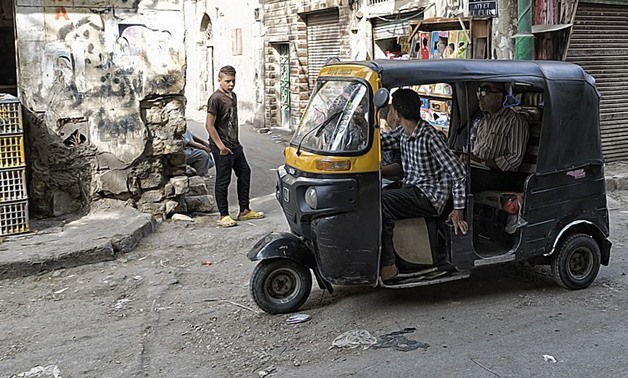
Toktok driver in old cairo – Wikimedia Commons/Wael Kenawey Photography
CAIRO – 19 November 2018: The developed three-wheel auto rickshaw, known in Egypt as toktok, has drawn controversy in the country since it appeared across its cities in 2005. However, satisfying alternatives have not yet been given.
Toktoks have been seen as double-edged swords. People inhabiting slums, humble regions and even some classy districts think they are comparatively cheap, fast, widespread and available. Although this can all be real, others still believe they are dangerous as the majority of toktoks have been so far unlicensed.
Hamdy Arafa, a professor of local administration and consultant for the development of slums, said that the "republic" of toktoks in the North African country consists of 2.9 million toktoks, adding that only 111,000 toktoks are licensed.
This came during an interview with Wael al-Ebrashi on ON E TV on Saturday.
Commenting on the growing number of toktok drivers, Arafa said that there are 730,000 diploma graduates of commerce, industry and agriculture schools annually, adding that he thinks their university curricula were not linked to the labor market, so most of them go for other jobs.
MP Mamdouh al-Husseini, a member of the Parliament's Local Administration Committee, said that some of the toktoks' drivers have resorted to such unlicensed vehicles for kidnapping, theft, bullying and terrorism.
He appealed to officials to reduce the costs of licensing toktoks, affirming that the cost of a tokTok's license exceeds LE 7,000 ($394). The price of new tok-toks can range between LE 29,000 ($1,632) to LE 32,000 ($1,801), according to 2018 vehicles' prices, which means that a toktok driver has to pay about 21 percent of his vehicle's price to license it.
During the same interview, Major General Emad Mahrous, Parliament's Transportation and Communications Committee's member, said that toktoks have become indispensable for people in some places.
Defending toktok drivers' rights, Mahrous said that toktoks have become legitimate in some of other countries, adding that the state until now allows the import of the three wheel vehicle.
A toktok is a common form of urban transportation. It is a development of the still available two-wheeled pulled rickshaw by which a runner draws a cart with a seat for one or two people. It is believed the pulled rickshaw was invented by Japan in the 19th century. Rickshaws then appeared in India, China and other big cities in Asia.
Bad record
Secretary of the Parliament’s Transportation Committee, Khaled Abdel Azeem, criticized the government in February for not taking actual steps to stop toktoks from plaguing Egyptian communities and turning them into slums.
The government could not set up an integrated plan to face the unjustified spread of toktoks, according to Abdel Azeem, although the government has warned repeatedly of the dangers toktoks pose to society.
Abdel Azeem wondered why the government has not applied the Industry Ministry’s 2014 decision to stop importing toktoks so as to take the first step towards ending the phenomenon. The ministry had decided in 2014 to ban toktoks for a year as it had been used in crimes and terrorist attacks, according to the government.
In November, 2017, a toktok caused the death of seven students when it plunged off a road into a conduit in Beheira governorate, Delta.
In September of the same year, while a police force was patrolling a town in Assiut, it suspected three people on a toktok, the ministry said in a statement. The three men opened fire at the force when it stopped them, according to the ministry. The force returned fire, killing one and wounding another. The third fled.
In the same month, a girl was killed and two others were severely injured after a toktok collided with a passenger train in Dishna, Qena, while trying to pass a railway crossing.
The U.S. Embassy in Colombo warned its citizens who were visiting Sri Lanka in June 2017 to avoid travelling alone in toktoks after a spate of sexual harassment complaints.
"The U.S. Embassy Colombo has been made aware of an increase in incidents involving toktok drivers in the Colombo area inappropriately touching female passengers," the embassy said in a statement.
Additional reporting by Egypt Today Staff

Comments
Leave a Comment